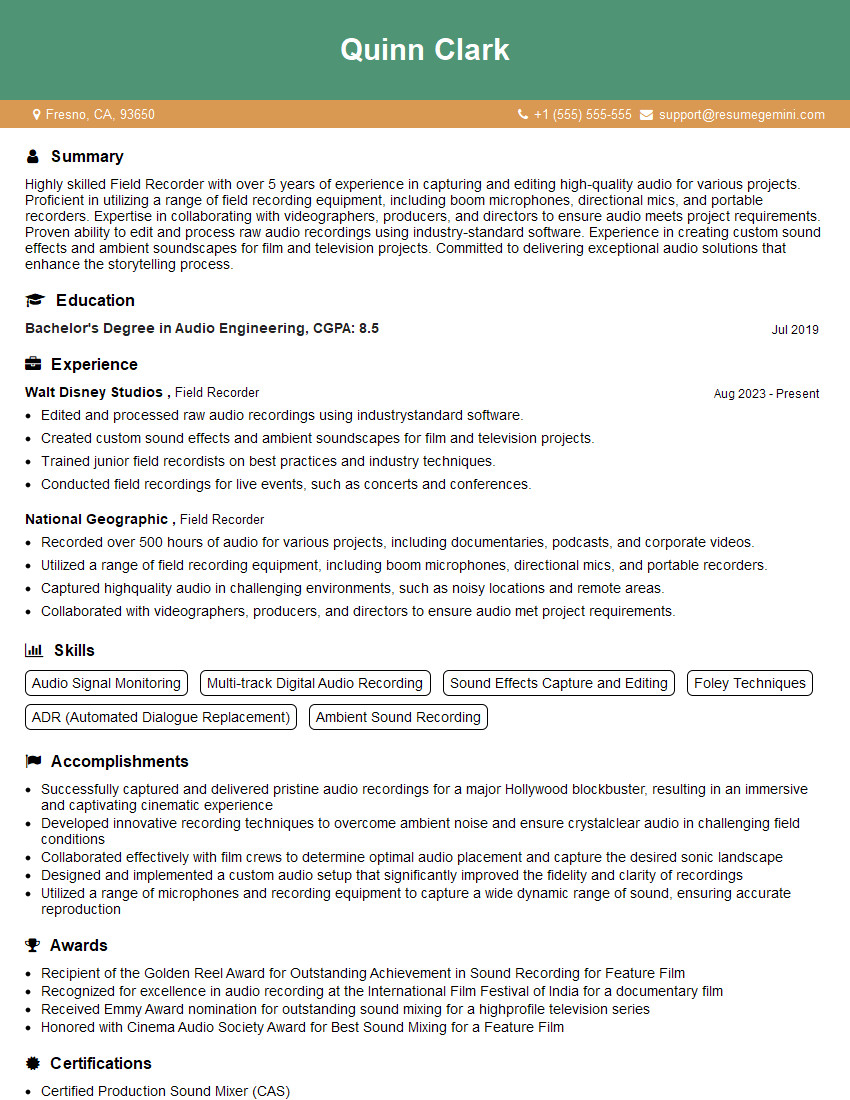Are you a seasoned Field Recorder seeking a new career path? Discover our professionally built Field Recorder Resume Template. This time-saving tool provides a solid foundation for your job search. Simply click “Edit Resume” to customize it with your unique experiences and achievements. Customize fonts and colors to match your personal style and increase your chances of landing your dream job. Explore more Resume Templates for additional options.

Quinn Clark
Field Recorder
Summary
Highly skilled Field Recorder with over 5 years of experience in capturing and editing high-quality audio for various projects. Proficient in utilizing a range of field recording equipment, including boom microphones, directional mics, and portable recorders. Expertise in collaborating with videographers, producers, and directors to ensure audio meets project requirements. Proven ability to edit and process raw audio recordings using industry-standard software. Experience in creating custom sound effects and ambient soundscapes for film and television projects. Committed to delivering exceptional audio solutions that enhance the storytelling process.
Education
Bachelor’s Degree in Audio Engineering
July 2019
Skills
- Audio Signal Monitoring
- Multi-track Digital Audio Recording
- Sound Effects Capture and Editing
- Foley Techniques
- ADR (Automated Dialogue Replacement)
- Ambient Sound Recording
Work Experience
Field Recorder
- Edited and processed raw audio recordings using industrystandard software.
- Created custom sound effects and ambient soundscapes for film and television projects.
- Trained junior field recordists on best practices and industry techniques.
- Conducted field recordings for live events, such as concerts and conferences.
Field Recorder
- Recorded over 500 hours of audio for various projects, including documentaries, podcasts, and corporate videos.
- Utilized a range of field recording equipment, including boom microphones, directional mics, and portable recorders.
- Captured highquality audio in challenging environments, such as noisy locations and remote areas.
- Collaborated with videographers, producers, and directors to ensure audio met project requirements.
Accomplishments
- Successfully captured and delivered pristine audio recordings for a major Hollywood blockbuster, resulting in an immersive and captivating cinematic experience
- Developed innovative recording techniques to overcome ambient noise and ensure crystalclear audio in challenging field conditions
- Collaborated effectively with film crews to determine optimal audio placement and capture the desired sonic landscape
- Designed and implemented a custom audio setup that significantly improved the fidelity and clarity of recordings
- Utilized a range of microphones and recording equipment to capture a wide dynamic range of sound, ensuring accurate reproduction
Awards
- Recipient of the Golden Reel Award for Outstanding Achievement in Sound Recording for Feature Film
- Recognized for excellence in audio recording at the International Film Festival of India for a documentary film
- Received Emmy Award nomination for outstanding sound mixing for a highprofile television series
- Honored with Cinema Audio Society Award for Best Sound Mixing for a Feature Film
Certificates
- Certified Production Sound Mixer (CAS)
- Certified Field Recorder (CFR)
- CEDAR Audio Academy Certificate
- Avid Certified User (ACU)
Career Expert Tips:
- Select the ideal resume template to showcase your professional experience effectively.
- Master the art of resume writing to highlight your unique qualifications and achievements.
- Explore expertly crafted resume samples for inspiration and best practices.
- Build your best resume for free this new year with ResumeGemini. Enjoy exclusive discounts on ATS optimized resume templates.
How To Write Resume For Field Recorder
- Highlight your technical skills and experience in using a variety of field recording equipment.
- Showcase your ability to capture high-quality audio in challenging environments.
- Emphasize your collaboration and communication skills, as you will be working closely with videographers, producers, and directors.
- Include any experience you have in editing and processing audio recordings.
- Demonstrate your passion for storytelling and how your audio work enhances the overall narrative.
Essential Experience Highlights for a Strong Field Recorder Resume
- Record high-quality audio for various projects, including documentaries, podcasts, and corporate videos.
- Utilize a range of field recording equipment, including boom microphones, directional mics, and portable recorders.
- Capture high-quality audio in challenging environments, such as noisy locations and remote areas.
- Collaborate with videographers, producers, and directors to ensure audio meets project requirements.
- Edit and process raw audio recordings using industry-standard software.
- Create custom sound effects and ambient soundscapes for film and television projects.
- Train junior field recordists on best practices and industry techniques.
Frequently Asked Questions (FAQ’s) For Field Recorder
What are the key skills required for a Field Recorder?
Key skills for a Field Recorder include expertise in audio signal monitoring, multi-track digital audio recording, sound effects capture and editing, Foley techniques, ADR (Automated Dialogue Replacement), and ambient sound recording.
What type of equipment do Field Recorders use?
Field Recorders typically use a range of equipment, including boom microphones, directional mics, portable recorders, and headphones.
What are the different types of projects Field Recorders work on?
Field Recorders work on a variety of projects, including documentaries, podcasts, corporate videos, film, and television shows.
What are the challenges of being a Field Recorder?
Challenges faced by Field Recorders include capturing high-quality audio in noisy environments, dealing with inclement weather conditions, and ensuring that the audio seamlessly integrates with the visual content.
What is the career path for a Field Recorder?
Field Recorders can advance their careers by specializing in specific areas such as sound design or post-production, or by moving into management roles.
What are the key qualities of a successful Field Recorder?
Successful Field Recorders possess strong technical skills, attention to detail, excellent communication skills, and a passion for capturing and editing audio.